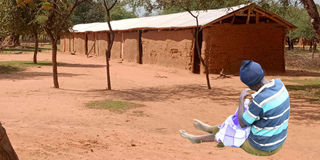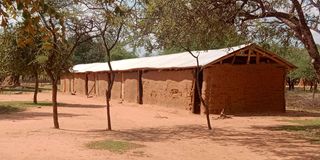The forgotten girls of West Pokot: How boarding schools could end a cycle of harm

Muddy buildings of Kaptukom Primary School in West Pokot County on July 13, 2024. Inset: A teen mother. Leaders have called for the setting up of boarding primary schools to protect girls from harmful practices including early marriages.
What you need to know:
- Lack of boarding schools exposes girls to FGM, child marriage, and teen pregnancies, worsening dropout rates and poverty.
- Education advocates urge government intervention to establish low-cost boarding schools, ensuring girls' safety, education access, and protection from harmful traditions.
Under the merciless sun of West Pokot County, children trek kilometres to reach the nearest school, often on empty stomachs. The region's challenging terrain and pastoral lifestyle have created circumstances where harmful traditional practices continue to thrive despite existing protective policies.
"Children start school at a later age because the school is far. They trek to school under scorching sun and mostly on an empty stomach because the place is semi-arid and marred by crop failure," explains Linah Kales, a teacher at Takaywa ECDE centre.
"Marriage is a survival strategy for most families to make ends meet. All these challenges become a fertile ground for school dropouts and low enrolment."
West Pokot County ranks second nationwide in teenage pregnancies at an alarming 36 per cent, more than double the national average of 15 per cent, according to the Kenya Demographic and Health Survey (KDHS) of 2022. Meanwhile, female genital mutilation (FGM) continues to plague the region at a rate of 44 per cent.
Among the most affected areas are Alale, Masol, Ombolion, and Chesegon in North and Central Pokot—remote regions where traditional practices still hold sway over modern governance.
Education challenges in pastoral communities
The absence of low-cost boarding schools in these pastoral areas has exposed adolescent girls to harmful practices that have led to teenage pregnancies. During rainy seasons, classrooms under trees become unusable, and when droughts strike, entire families migrate with their livestock.
Christine Lokotan, a resident of Chesegon, highlights another dimension of the crisis: "We have hundreds of children who are supposed to attend ECDE," she says, referring to the many children orphaned by banditry who are not in school.
Linah Kales has witnessed the infrastructure problems first-hand. "Learners have embraced education, but there are no schools, and many learn under trees. They have difficulties during rainy seasons and have no desks; they sit on stones," she explains.
She has challenged both the Ministry of Education and the county government "to look at proper ways of ensuring that nomadic pastoralist communities are not left out of education."

Kaptukom Primary School in West Pokot County in this picture taken on July 13, 2024.
World Vision child protection officer Teresa Cheptoo emphasizes how girls face additional obstacles.
"Girls are further burdened by heavy domestic chores. Many children, especially girls, drop out of school because they lack essential commodities. Girls are given heavy jobs, hence forgetting about education."
The nomadic lifestyle of parents compounds these problems.
"Many parents are pastoralists who move with their animals and children are forced to go with them," Cheptoo explains. "Frequent migration by parents to Uganda in search of pasture and water during dry seasons has largely hampered learning for girls."
Susan Krop, Chairperson of the Kong'elai Women Network, has observed with growing alarm how early pregnancies perpetuate both poverty and illiteracy.
"Girls aged between 12 and 18 are the most affected as they drop out of school even before they get to class eight," she notes. "Our children have suffered for a long time and the government should come to their rescue."
Boarding schools as a solution
Education stakeholders believe establishing low-cost boarding schools in these pastoral communities could break this cycle of harmful practices.
"Boarding schools should be introduced, especially for girls," Linah Kales insists. "This will save them from the merciless jaws of retrogressive cultural practices, namely FGM and forced and early marriages."
Teresa Cheptoo agrees that boarding facilities would serve multiple purposes.
"Setting up boarding would increase the retention of girls, especially in primary schools that would also serve as rescue centres for those escaping FGM and early marriages," she explains. "Many girls have been running away from these vices and go to a few rescue centres."
West Pokot Woman Representative Rael Kasiwai has taken up the cause, appealing to the national government to implement affirmative action for girls in these communities.
"We should give priority to girls who have been side-lined," she argues, while challenging the county government to address infrastructure issues. "The poor infrastructure causes many children to terminate their education."
Read more: FGM's bold return: A decade of silence, now proudly public, and why old messages aren't working
Senator Julius Murgor emphasizes the economic realities behind the education crisis.
"Most learners are from poor families, hence the need to start schools to save children from outdated traditions. The pupils don't pay at all," he explains. "There is nothing for learners at home and all the facilities are only in school. There is no food or paraffin at home."
The government appears to be responding, at least in part. West Pokot Education Director Simon Wamae has urged livestock farmers to leave their children behind in low-cost boarding primary schools instead of migrating with them.
"The government is providing food in schools under the feeding program to ensure learners stay behind as their parents move from place to place in search of pasture during dry seasons," he discloses.




